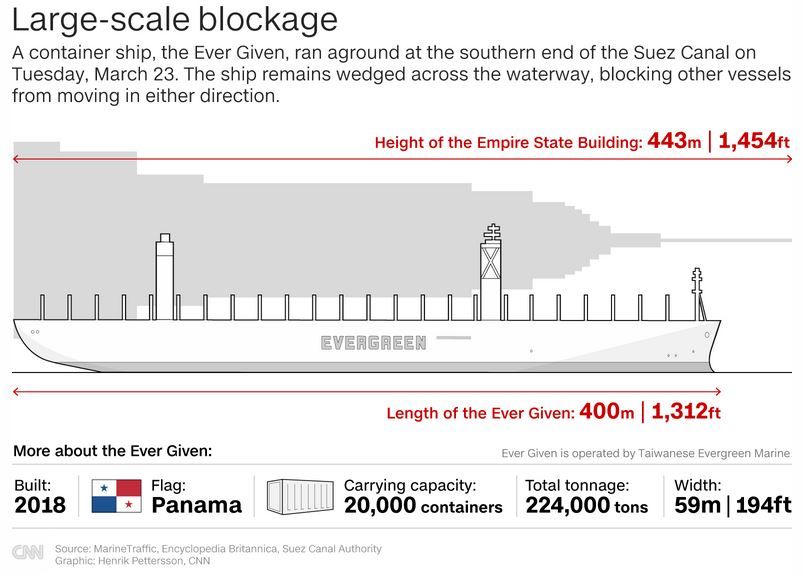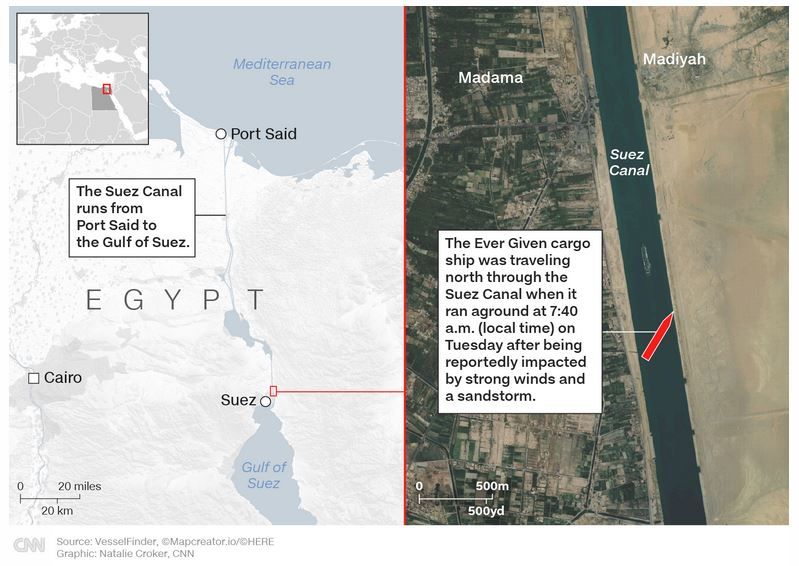Tug boats are working to free a large container ship stuck in Egypt's Suez Canal, halting traffic through one of the busiest and most important waterways in the world.
What's happening: Work continues to clear sand and mud away from the Ever Given, a 224,000-ton vessel that ran aground after 40-knot winds and a sandstorm caused low visibility and poor navigation.
Ending the dramatic traffic jam, which has prevented dozens of ships from passing through, will not be easy. The effort could take "days to weeks," according to the CEO of Boskalis, whose sister company SMIT Salvage is now working to dislodge the ship.
Big picture: About 10% of global trade passes through the Suez Canal, according to Allianz, a top shipping insurer. Lloyd's List, a shipping industry journal, said that nearly 19,000 vessels transited the artery last year.
The incident comes at an extremely difficult moment for global supply chains. The pandemic has snarled global shipping, leaving empty containers stranded in the wrong places. Meanwhile, carmakers are scrambling to address a global chip shortage that has forced the closure of plants in multiple countries.

Allianz said ships "face costly and lengthy deviations if canal is not opened soon." Diverting vessels via the Cape of Good Hope in the southern tip of Africa would add roughly two weeks to their journeys.
Danish shipping company Maersk said that seven of its vessels have been affected. Four are already in the canal system and another three are waiting to enter.
"The incident continues to create long tailbacks on the waterway, stopping vessels from passing and causing delays," it said in a statement.
The episode has also injected volatility into oil markets, which have been under pressure recently as investors weigh supply and demand heading into the next phase of the pandemic.
Brent crude futures, the global benchmark for oil prices, shot up nearly 6% on Wednesday as traders raced to assess the ramifications of the blockage. Prices fell back again Thursday, and were last down 1.4% to $63.55 per barrel.
In a note to clients, Commerzbank — citing analytics firm Vortexa — said that 10 oil tankers with 13 million barrels of crude on board are currently stuck in the Suez canal.
"This equates roughly to the amount of oil produced in one day by Saudi Arabia and Iraq, the two largest OPEC producers," the German bank said.
Time is of the essence as the jam drags on, with the buildup poised to get worse by the day. But for now, oil traders are trying their best to look past the disruption.
"The situation is likely to return to normal at the beginning of next week once the container ship has been freed, shifting the focus back onto the demand risks," Commerzbank said.

How AstraZeneca went from pandemic hero to vaccine villain
After teaming up with Oxford University, AstraZeneca (AZN) produced a safe and effective Covid-19 vaccine in just nine months, a huge achievement that will help end the pandemic.
But a series of missteps along the way has led to scathing criticism from policymakers and health officials, tarnishing the company's image as a hero of the coronavirus era.
See here: The Anglo-Swedish drugmaker mistakenly gave some volunteers a half dose of the vaccine during clinical trials, and it has been criticized for omitting crucial information from its public statements. US regulators have questioned the accuracy of its vaccine data, and severe production delays in
Europe have resulted in a political firestorm and a breakdown in relations with EU leaders.
"What we have with AstraZeneca is a company that is not straightforward, that cannot be relied upon," Philippe Lamberts, a Belgian member of the European Parliament, said in a radio interview with the BBC on Wednesday.
AstraZeneca's failure to deliver tens of millions of promised doses to the European Union, which is struggling to roll out vaccination programs, led the bloc to impose export restrictions that have already prevented at least one shipment of vaccines to Australia. Leaders could move to make the restrictions even tighter Thursday.
AstraZeneca has cited "lower-than-expected output from the production process" as a major complication in Europe.
"As our teams learn from each other and improve their knowledge, the yield is increasing," CEO Pascal Soriot said in February. "Manufacturing of a vaccine is a very complex biological process."
Meanwhile, the US National Institute of Allergy and Infectious Diseases expressed concerns earlier this week that AstraZeneca had presented "outdated" data from a trial of the vaccine's effectiveness. Dr. Anthony Fauci, the agency's director, called it "an unforced error" that could erode trust in a "very good vaccine."
The latest: AstraZeneca updated its data on Thursday, reporting that the trials showed its vaccine to be 76% effective against Covid-19 symptoms. Earlier this week, it had said its shot was 79% effective.
However, the rare rebuke from US regulators was a major blow to the company's credibility.
"They've made one mistake after the other," said Jeffrey Lazarus, head of the health systems research group at the Barcelona Institute for Global Health.
How Wall Street is fighting Covid burnout
To keep employees happy despite the rampant stress and exhaustion of working during a pandemic, some Wall Street banks are handing out toys, gifts and perks, my CNN Business colleague Alexis Benveniste reports.
Jefferies sent a memo to its 1,129 analysts and associates, offering the option to pick between a Peloton bike, a MIRROR home workout system, or an Apple package that includes an Apple Watch, iPad and AirPods.
"You have given us your all these past twelve months and these gifts are a sign of our deep appreciation for your dedication, sacrifice and contribution to our success in the face of challenging circumstances," CEO Rich Handler wrote in a memo to employees.
Earlier this week, Citi announced that it's launching "Zoom-Free Fridays." But it may not be much of a change: Citi said employees may still be expected to hop on internal audio-only calls as well as external Zoom calls, including with clients and regulators.
Remember: Slammed by a wave of deals, some Wall Street employees are fed up. Goldman Sachs analysts spoke out earlier this year about working 95-hour weeks and enduring "inhumane" treatment. CEO David Solomon has said the bank will strengthen enforcement of its free Saturday rule and speed up the hiring of junior bankers.
These days, free food and gym memberships aren't options to boost team morale. That's forcing banks to get creative as they try to stave off burnout.















